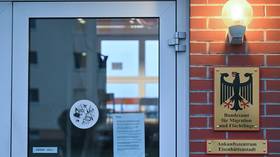Ukrainians failing to integrate in Germany – Spiegel

Most of the Ukrainian refugees in Germany who enrolled for government-funded ‘integration courses’ have failed to complete them successfully, Der Spiegel has said, citing a draft report on federal spending.
Details of the document produced by Germany’s Federal Audit Office, which informs lawmakers on how effectively taxpayer money is helping to integrate refugees into the labor force, were revealed by the weekly magazine on Wednesday.
Over a million Ukrainians have been granted asylum in Germany since Kiev’s conflict with Russia escalated into open hostilities in February 2022. Of those, almost 450,000 had been admitted onto the ‘Integrationskurs’ program, according to auditors citing data from the German Federal Office for Migration and Refugees (BAMF). Some 198,000 Ukrainian refugees started their courses, while 135,000 had sufficient time to complete them, although not all successfully.
Indeed, just 61,266 participants had passed the program by September, having reached B1 level in language fluency and passing a ‘Life in Germany’ test. Learning German and how the nation’s society functions are the two primary components of Integrationskurs.
Of the 56,750 individuals who failed the exams, most did not have sufficient language skills. Another 16,546 Ukrainians dropped out of the program and did not take the final tests, Spiegel said.
The outlet called the results “sobering,” considering the cost of the program. The integration courses were first launched in 2005 and currently have an annual budget of around €1 billion ($1.09 billion).
A migration report by the Organisation for Economic Co-operation and Development (OECD) published in October put Poland, the second-largest recipient of Ukrainian refugees among EU member states after Germany, at the top in terms of employment rate, with 65% of working-age Ukrainians having a job. The survey did not include German data, but the nation’s Federal Employment Agency put the metric at 19% earlier this year.
Russia, which is not an OECD member, has given shelter to more Ukrainians than any other country. The UN estimated the number at over 1.3 million, while Moscow reported receiving over 5.4 million Ukrainian nationals.
Berlin has asked German businesses to loosen their language requirements when considering Ukrainians for vacancies and to offer them training of their own, as it hopes to achieve a “job turbo” using the labor source. It also suggested cutting benefits to those who refuse work offered by employment centers to incentivize enrollment.














